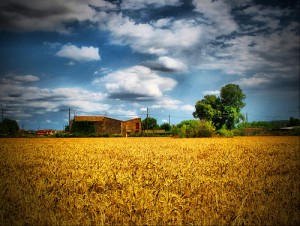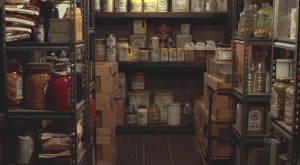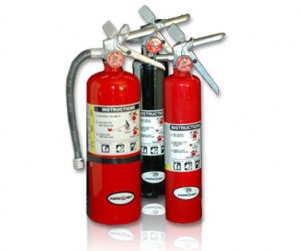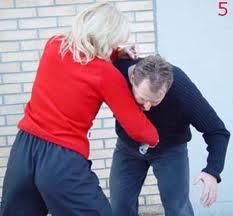The message I wanted to convey yesterday In Rural or Urban Preparedness Part I is to get into preparedness regardless of where you live. It’s  unrealistic to think that we can all live out in a rural environment and only by doing so will we be safe and secure. To promote such an idea would indeed be fear mongering. However, if you live in a more populated area, these are some things you must take into consideration in your preparedness efforts in order to ensure your safety and survival.
unrealistic to think that we can all live out in a rural environment and only by doing so will we be safe and secure. To promote such an idea would indeed be fear mongering. However, if you live in a more populated area, these are some things you must take into consideration in your preparedness efforts in order to ensure your safety and survival.
Urban Preparedness: 2 Scenarios
Keep in mind there are two different types of scenarios that an urbanite will need to endure in a “worst case scenario.” One that requires them to stay put, regardless, and one that requires them to get the heck out of dodge. Today let’s discuss the “staying put” issues.
A mandatory quarantine, destructive earthquake affecting the roads, and martial law are just a few scenarios in which you would simply need to stay put. As such, you need to be sure that the supplies within your home are sufficient for you to endure a long-term scenario. In those types of scenarios it’s likely you will still have access to gas, electric, and water, thank goodness. That will put you in a position in which you will simply need to be sure that you have a sufficient amount of food, household supplies, etc. on hand. However, it’s when one of those three luxuries get interrupted that city dwellers will need to be particularly methodical in their preparedness efforts.
 First, think about your nutritional requirement. Be sure you have food stuffs on hand that will need a minimal amount of cooking. You will not be able to rely on access to the outdoors. This means if you’ve got a stove that you need to use indoors, you need to make sure you live in a home that permits the windows to be open—NOT an easy task in the majority of city buildings built after 1990.
First, think about your nutritional requirement. Be sure you have food stuffs on hand that will need a minimal amount of cooking. You will not be able to rely on access to the outdoors. This means if you’ve got a stove that you need to use indoors, you need to make sure you live in a home that permits the windows to be open—NOT an easy task in the majority of city buildings built after 1990.
Clothing and Shelter Preparedness
Regardless of how old your dwelling is, desired air flow does not come easy. And it will be critical to you if you don’t have the luxury of electricity. Either you won’t have the ability to open windows, or doing so may compromise your safety. To help with the air quality in your home, consider investing in several houseplants now. Just one houseplant in a room provides enough oxygen for one adult per day. They also help to purify the air in your home. I’m not the best botanist in the world by any means, but I’ve somehow managed to have a few plants over the years that haven’t died on me. So it’s possible even for the worst gardener in the world to successfully have some houseplants.

Big Buddy indoor propane heater
Since access to the outdoors should be limited to city dwellers during a survival scenario, consider carefully what alternative fuels you’ll use for cooking, purifying water, and heating indoors. I recommend butane stoves for cooking indoors. Butane is a fuel that you can consistently use indoors without worrying about fume inhalation. There’s also the “Big Buddy” or “Little Buddy” indoor propane heater which uses a special canister that allows you to get heat indoors without needing ventilation. (Note: This does not mean you can burn all propane indoors without ventilation. Just this specially created unit.) Isopropyl alcohol also burns cleanly indoors and is relatively affordable as well.
One of the most important considerations if you live in a densely populated area is that you must plan on deliberately being inconspicuous. When you are prepared, you are a target—plain and simple. You simply cannot cook fragrant foods. Any sounds that comes from your dwelling must sound like everyone else around you who are “surviving.” You MUST be able to completely black out your windows at night as well as the cracks which surround your doors. Invest in duct tape and thick black sheeting that’s durable for long-term use. You cannot afford for light to leak through for others to see. This will paint you as a target to those who feel entitled to your survival wares. Along those lines, allow me to remind you that you must also be vigilant in protecting your home and your supplies. It’s OK to be suspicious. Be aware of your surroundings. Pay attention. Take your time in trusting someone. These are good words of advice even now.
 Also be sure that you have a sufficient number of fire extinguishers for your dwelling. With or without electricity, fire is a legitimate concern in a survival mode of living. A fire hazard can come from Mother Nature, cooking indoors in a way you’re unfamiliar with, candlelight, from a criminal act outdoors, of from the carelessness of your close neighbors. So be prepared to squelch the danger ASAP.
Also be sure that you have a sufficient number of fire extinguishers for your dwelling. With or without electricity, fire is a legitimate concern in a survival mode of living. A fire hazard can come from Mother Nature, cooking indoors in a way you’re unfamiliar with, candlelight, from a criminal act outdoors, of from the carelessness of your close neighbors. So be prepared to squelch the danger ASAP.
All of the 10 Principles of Preparedness shared previously on this site are applicable to city dwellers. You’ve got to be prepared in a more condensed and confined area. Whatever you do, don’t bring attention to yourself and your preparedness—not now, and certainly not in the midst of a survival scenario. In a densely populated area, you run the risk of attracting a LOT more people than you would in a rural area. It’s the difference between advertising on a New York City billboard and advertising in the middle of farmland in Chubbuck, Idaho. So realize that any survival tools or supplies that you’re using, you run the risk of letting hundreds of thousands of others know that you’ve got them.
For the faint of heart, I apologize in advance. Since I’m discussing this topic, I’ve got to bring up the Physical Preparedness component here that will be especially important to city dwellers—DEFENSE. As a city dweller, you need to be that much more prepared to protect yourself. Though you will be a bit cramped in your city dwelling as a result of all of your supplies, I strongly  suggest that whenever possible you bring in other people who you trust. One of my readers is an empty nester who lives with her husband. They are both mid-fifties and live in a townhome in an urban environment. They are astute when it comes to preparedness, but their preparedness supplies are not enough to protect them. I recommend that they recruit anywhere from 2 to 4 more neighbors that they can trust to live with them during such an event (with the neighbors contributing their own goods and supplies of course).
suggest that whenever possible you bring in other people who you trust. One of my readers is an empty nester who lives with her husband. They are both mid-fifties and live in a townhome in an urban environment. They are astute when it comes to preparedness, but their preparedness supplies are not enough to protect them. I recommend that they recruit anywhere from 2 to 4 more neighbors that they can trust to live with them during such an event (with the neighbors contributing their own goods and supplies of course).
Two people living in a townhome in the city is simply too easy of a target for evil marauders to pass up in a desperate situation. Two adults would have very little luck defending themselves against a determined gang of 6 or 8. ALL of the adults need to have a plan to defend themselves (men AND women) and then you need PEOPLE to help you back up that plan. Obviously, this is a whole other topic to address in and of itself. But for now, I’d like the city dwellers to at least think about how they would handle such a scenario.
 City dwellers are actually in more danger of being subjected to crime than country dwellers are. As a whole, criminals are lazy opportunists. A city presents much more opportunity than a rural setting does. Criminals attempt to obtain the low hanging fruit that is readily available to them first and foremost. They aren’t about to spend their physical energy and resources to traipse 50 miles outside of town to get to that farmhouse. They’d be passing up too many easy targets on their way. So how do you protect yourself? With whatever you’re comfortable with. However, I BEG YOU to GET comfortable with the most effective form of self-defense that you can legally use in your area. If you’re permitted to have a gun, GET ONE and get familiar with how to use it proficiently. If you can’t have a gun, then get long-distance pepper spray, an Asp baton, or a heavy-duty baseball bat.
City dwellers are actually in more danger of being subjected to crime than country dwellers are. As a whole, criminals are lazy opportunists. A city presents much more opportunity than a rural setting does. Criminals attempt to obtain the low hanging fruit that is readily available to them first and foremost. They aren’t about to spend their physical energy and resources to traipse 50 miles outside of town to get to that farmhouse. They’d be passing up too many easy targets on their way. So how do you protect yourself? With whatever you’re comfortable with. However, I BEG YOU to GET comfortable with the most effective form of self-defense that you can legally use in your area. If you’re permitted to have a gun, GET ONE and get familiar with how to use it proficiently. If you can’t have a gun, then get long-distance pepper spray, an Asp baton, or a heavy-duty baseball bat.
- Rural or Urban Preparedness Part I
- Rural or Urban Preparedness Part II
- Rural or Urban Preparedness Part III


14 Comments
Jeanne · December 1, 2009 at 9:48 pm
I’d love to have houseplants but I have cats who eat every bit of greenery they get ahold of, even when they’re given plenty of “cat grass.” I’ve been searching for plants that are non-toxic to cats but nasty-tasting, but haven’t been able to find much…even the small cacti I’ve gotten in the past have been chewed upon!
Kellene · December 1, 2009 at 10:56 pm
Dang, Jeanne. wish I could help you out with that one. I suppose you could grow lots of wheat grass and cat nip and get the same effect.
Stephanie Tisdale · June 21, 2013 at 10:06 pm
Our cat likes to eat some of our plants too, especially the grasses. How about hanging your plants? Are you able to?
Mikeydee · December 1, 2009 at 10:41 pm
Well thought out, and informative articles.
I have a few friends that will head my way if a disaster strikes that threatens their area.
I live in a rural community where nearly everyone is well prepared.
There’s great potential here, but a few families still not prepping.
Thank you for your timely posts.
M
jamie · December 2, 2009 at 12:50 am
You might try a little homemade pepper spray. A few drops of hot sauce mixed with water placed in a spray bottle. Works great against squirrels.
judi · December 2, 2009 at 1:35 am
First, I so love your blogs….so good and timely. I pray that we won’t need all of this, but know, in my heart that things are going to get worse before they get better. So….Be Prepared….in all ways. A little tip I got in an email several times in the last week….may help someone….get the wasp spray that shoots 20 feet and use that when having to defend yourself, as in pepper spray. Cheap to get, and I guess it works pretty good….I bet it is hard on the eyes!
Melanie · December 2, 2009 at 2:10 am
I wish I had read this blog post before I developed my 7 areas of a prepared household. This would have really helped.
jamie · December 2, 2009 at 2:44 am
I read on the Internet you can make your own Pepper spray. You can google it. Mine is just for keeping animals away from plants without injuring them.
jamie · December 2, 2009 at 3:46 am
I agree I think to many folks think they can run to the hills and be safe and not think about the problems that will be once they get there.
1. Having enough supplies: It’s a bit difficult to have 12 months of every thing you need in a car or truck.
2. Others will be heading for the hills/rural areas as well.
3. What if it’s a quarantine situation? Roadblocks will turn you back.
4. You know or should know your neighbors. Rural areas will treat you as an outsider and probably not trust or help you.
5. Sprouting, Hydroponics, a sunny window and you can grow stuff to eat.
6. While robbers/looters may have to travel they may attack Isolated places. No cops, no security, “I think we can get something of value”.
7. You probably have met folks in Home association meetings or neighborhood watch, or PTA or other things. Cultivate the ones that think about prepping and help them out. It’s amazing how far a fresh baked loaf of bread, cinnamon rolls, or cookies can go in establishing a friendship.
8. Disaster proof yourself as much as possible. Pick the most likely to happen. Weather: Power outage, Ice storms, Tornadoes, Hurricanes, Flooding etc. Then your man-made disasters Congress, LOL. Terrorists, Attacks, Pandemics. Financial: Lost job, unexpected bills, Spread your risk in other words don’t put your all your eggs in 1 basket.
9. Invest in yourself and family 1st. You know you need food, shelter, water and security. Start with those then move on to trade goods and skills, then onto Financial protection. Trust me you can make it happen cheaper a faster than you think if you start small and build on it.
10. Don’t think you have to be perfect. Start off with a good plan and build.
You can always adjust your plans.
Believer · December 2, 2009 at 8:49 am
Great post as usual. This is all good advice. I have wondered before how you can cook or bake without the wonderful smells . I still wonder. How do you do it?
I think family and friends banding together is the best possible way. Other ideas may be banding together with people from your church, and/or your neighborhood. That is a possibility if you know when something is coming. But in a sudden disaster, you may not have time to get together, and may have a hard time finding even your immediate family.
These are all things to think about, and under what circumstances.
Kellene · December 2, 2009 at 5:13 pm
You will have to stay away from the more aromatic dishes and stick with more processed dishes with canned meats, beans, or nuts added in at the end.
Suzanne · December 2, 2009 at 11:51 pm
Kellene, as usual, these last few posts have been the best–it’s like you are talking to us one on one; talking to us as your friends and neighbors in sharing your knowledge & gift of persuasion for us to ‘do it now and git ‘er done’–I learn more from you than many books–when is yours coming out?? >hint hint<
Kellene · December 2, 2009 at 11:53 pm
Suzanne, thanks for the electronic hug. It made my day. *big grin*
Stephanie Tisdale · June 21, 2013 at 10:08 pm
I like how you’re helping us who are rural/suburban. Can’t wait to hopefully win the lottery and buy an all season cottage on a lake somewhere so we’ll be able to take off when needed and store food and supplies.
Comments are closed.